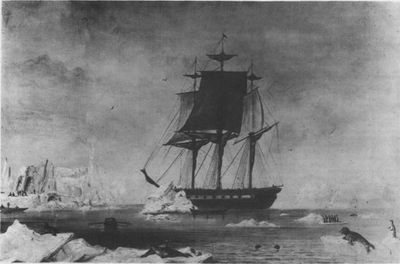 |
| The USS Vincennes, one of the ships of the Ex. Ex., visiting Antarctica in 1840. (credit: US Navy) |
The Elizabethan age of exploration - 15th, 16th Century
This period from the 15th to 17th Century was perhaps the most important era of exploration. It laid the seeds of globalisation as Europe discovered the Americas, the Indian continent and made the first circumnavigation of the world. This age of discovery came about for a few reasons- The fall of Constantinople made trade with Asia across land very difficult. There was an incentive for Europeans to find direct sea routes to the India continent. This was first achieved by the Portuguese Vasco de Gama in 1498, when he arrived in Calicut, India.
- A wealth of Europe. European countries, like Spain, Portugal, Holland and England became increasingly wealthy and good afford to fund exploration. In addition, these explorations became quite profitable due to trade and/or plundering of raw materials. The Spanish monarchy funded Christopher Colombus in 1492 to travel to America.
- Christian missionary movement. Part of the motive for exploration was to share the principles of Christianity and convert 'heathen pagans'
- Empire rivalry. One of the biggest motivations was to extend the political, military and political power of the European nations by claiming parts of the 'new world.' For example, one of England's most famous explorers Sir Walter Raleigh was executed after fighting the Spanish.
- Improvements in technology which enabled longer sea journeys.
The dark side of the age of exploration.
The age of exploration could also be called the age of exploitation. European voyages paved the way for the conquest of American countries. The age of exploration was also tied up with the growth in the slave trade. Notable explorers like Sir Francis Drake were closely tied up with the slave trade. (Drake was also considered a pirate by the Spanish). Many native inhabitants suffered from the coming of Europeans, due to the transfer of infectious diseases, slavery or loss of freedom.On the positive side, the age of exploration helped widen horizons (proving the world wasn't flat) and beginning the evolutionary movement towards a global world.
The Heroic Age of exploration - Polar regions
In the late Nineteenth Century / early Twentieth Century, there was the heroic age of Antarctic exploration. Many voyages were undertaken with only limited equipment, but this enabled a great improvement in knowledge about the Antarctic continent. The most famous explorations of this period were led by- Ernest Shackleton.British Antarctic Expedition 1907 (Nimrod Expedition)
- Roald Amundsen reaching the South Pole in 1911.
- Robert F Scott's - Antarctic expedition of 1910-11 - which led to death of all five members, close to the South Pole
- Ernest Shackleton - Endurance 1914-17 - First transcontinental crossing attempt
Other great periods of exploration
- Space Exploration 1950s and 1960s
- Marco Polo's journeys to Asia in the 13th Century
- African explorations of the Nineteenth Century. Led by David Livingstone's attempt to find the source of the Nile, the late Nineteenth Century saw a 'dash for Africa'